
Powerful Cyclone Hits the Solomons, Vanuatu, Fiji, Tonga
Solomon Islands
The most powerful storm to develop in the South Pacific basin in more than two years, severe Tropical Cyclone Harold has now left a trail of destruction across four nations. After developing between the Solomon Islands and Papua New Guinea on April 1, Harold almost immediately claimed 27 lives in the Solomon Islands. A ferry defied cyclone warnings, departed the densely-populated capital of Honiara in deteriorating conditions, and lost 27 souls overboard to a large wave.
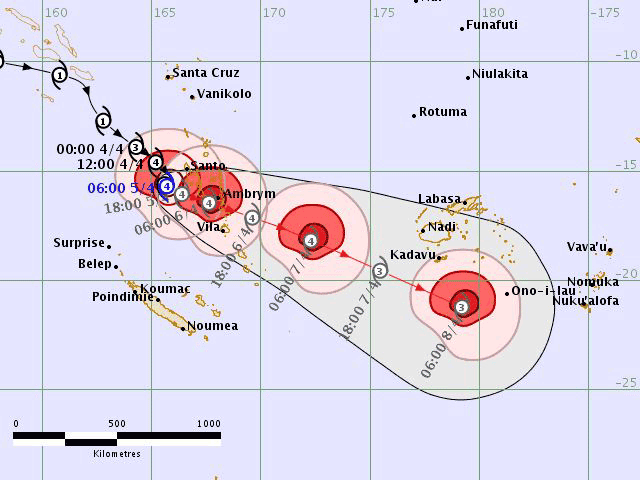
Vanuatu
Having claimed life in the Solomons, Harold continued on toward Vanuatu. Rapidly intensifying, it became a Category 5 storm before it stalled out west of Vanuatu as a ridge of high pressure halted its progress eastward. Dumping significant amounts of rain and bringing winds over 150 knots, Harold battered Vanuatu for days before finally making landfall and moving farther southeast. Particularly affected was the large island of Espiritu Santo. Some 70 percent of the structures in the nation’s second-largest city of Luganville have been damaged, with many buildings in the city of 16,500 reduced to their foundations. Official reports on lives lost and damage are understandably delayed.
Fiji
After its brief encounter with land in Vanuatu, Harold re-intensified and aimed at Fiji. The majority of local cruising yachts in western Fiji headed for the mangroves at Port Denarau, near the city of Nadi. This writer weathered the cyclone at the cruising hotspot of Musket Cove, all the way on the inside lagoon. Cruising yachts at both spots fared well, seeing winds of around and over 60 knots, though with virtually no sea state.
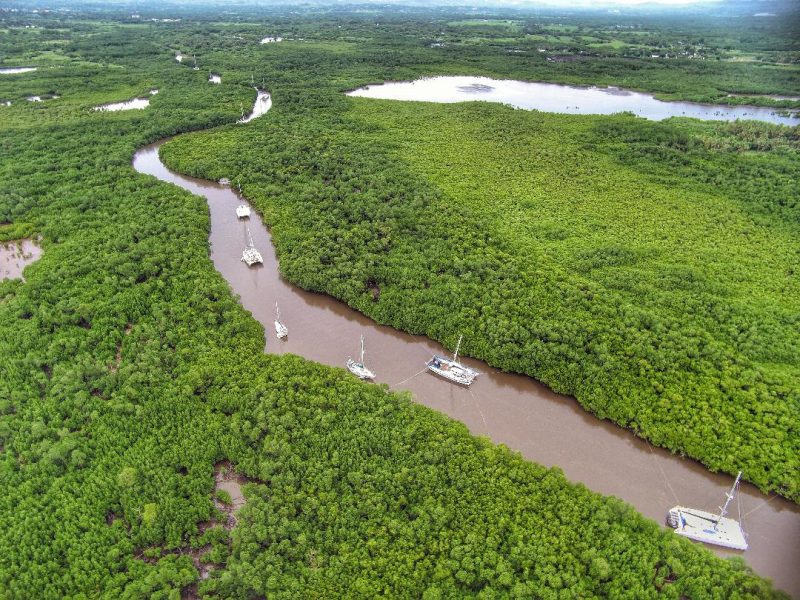
Port Denarau and Musket Cove themselves both suffered similar fates as (fortunately) empty and evacuated docks ripped apart during the intense conditions of the storm. Five miles away from Musket Cove, the famous surf and kiting resort at Namotu Island claims to have seen winds of around 100 mph. Incredibly, the surf-contest scoring tower at the world-famous wave ‘Cloudbreak’ — an iconic landmark that had stood at the reef for decades — is no longer there.
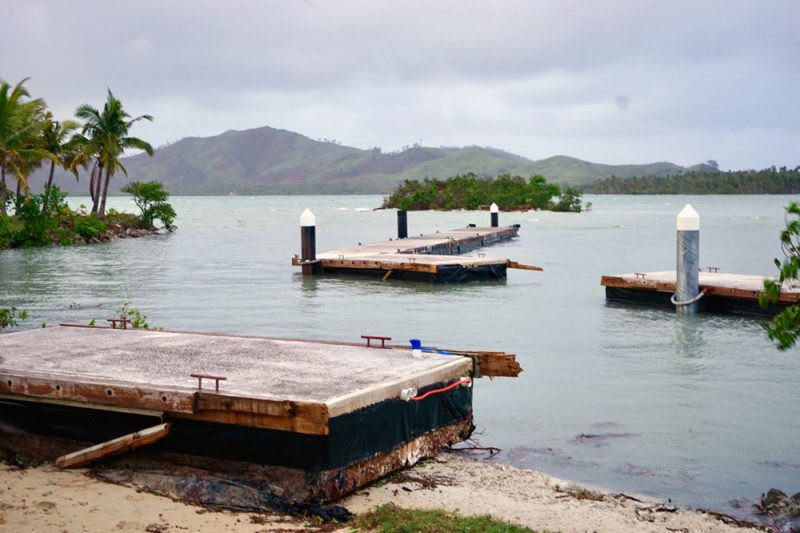
While Fiji’s main island of Viti Levu sustained a lot of damage, it was the fourth-largest island in the country, Kadavu, that got hit the hardest. Cyclone Harold basically rolled over the top of Kadavu as a strong Category 4, bringing devastating damage. As with the Solomons and Vanuatu, details out of Kadavu are slow to emerge, though relief and assessment efforts are already underway. As well as the cyclone, at least three tornadoes — very rare for Fiji — ripped through the country. One severely damaged a school and community. After Fiji, Harold made his way toward Tonga, where he again left a trail of destruction. The full extent of the damage won’t be known for some time yet.
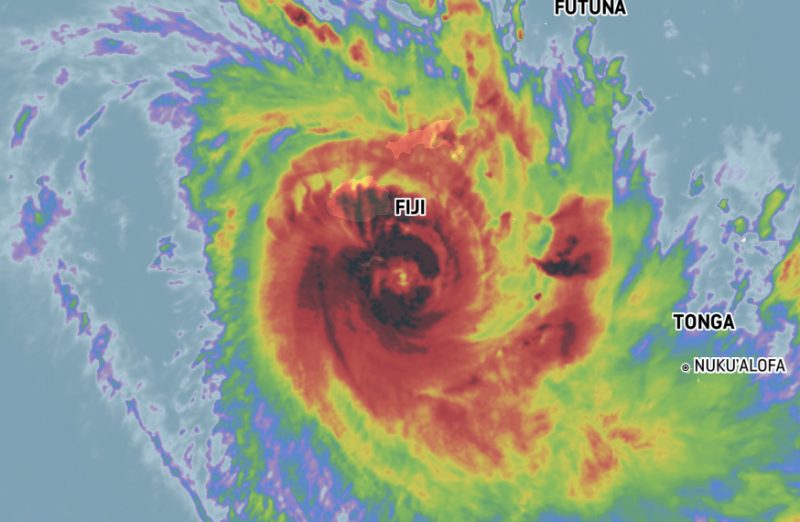
Tropical Cyclone Harold was an incredibly powerful and devastating storm in a region that is already dealing with the COVID-19 pandemic. With resources spread thin, neighboring countries such as Australia and New Zealand have already stepped up with much-needed support. Some cruisers in the local community (including this writer) are beginning to identify needs and how cruisers may play a role in also helping out. More on that in a future installment.
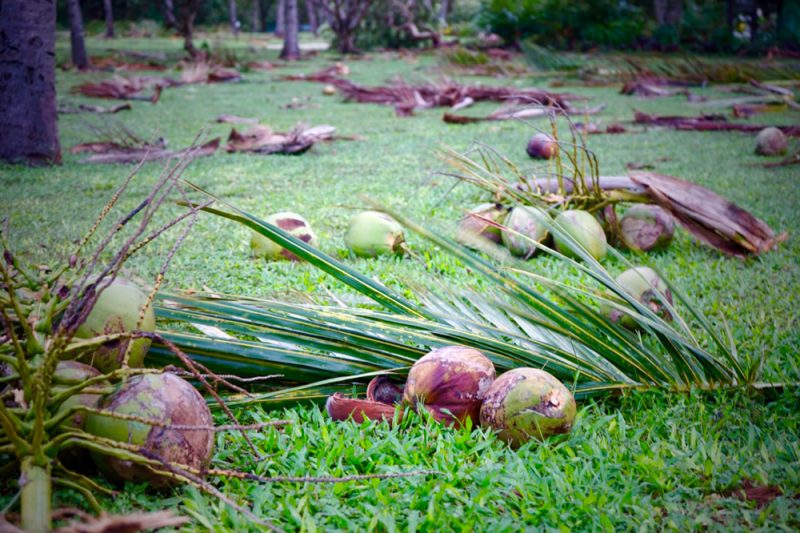
God bless Fiji.
Full Moon Rising over San Francisco Bay
One of the beautiful things to appreciate this week was the full Pink Moon rising over San Francisco Bay. Josh Dvorson sent us this photo, taken by a hiking and racing friend, of his lone sailboat heading out of Sausalito.
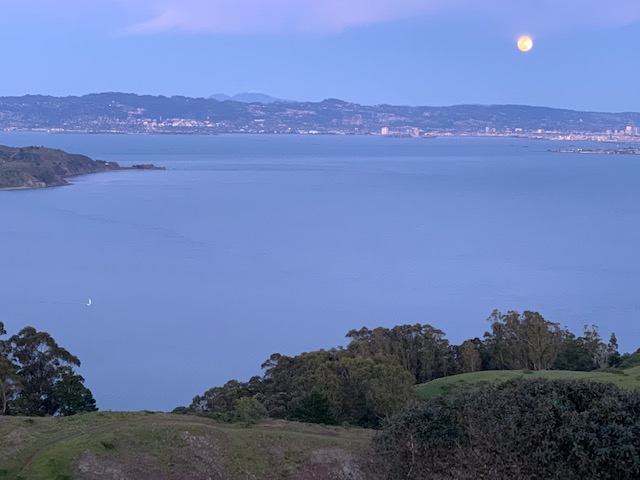
Westwind Boat Detailing
Seaward Does the Baja Bash as She Returns to San Francisco Bay
On Monday evening at around 9:30, Call of the Sea’s schooner Seaward retied her dock lines in Sausalito, three months and 15 days after sailing out the Gate on her way to Mexico. The vessel’s welcoming party was a small but enthusiastic group of Matthew Turner’s crew who had assembled to catch lines.
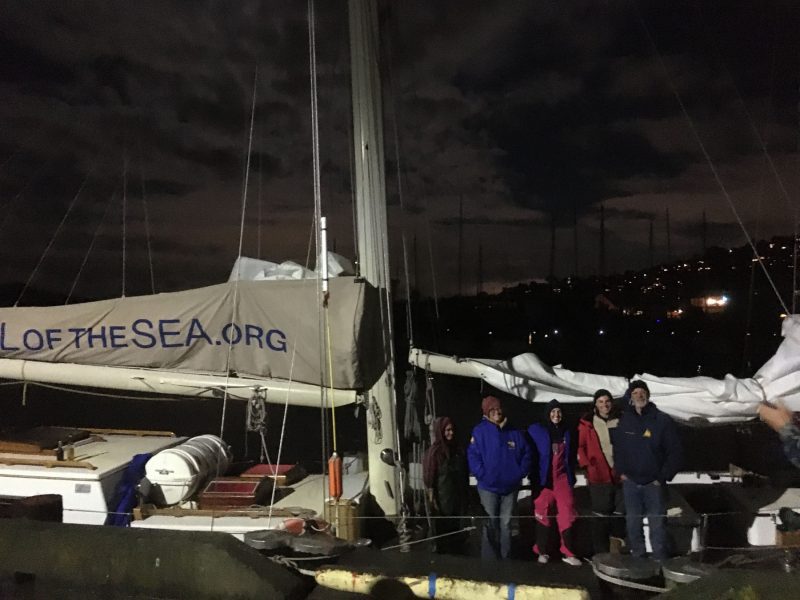
The crew’s blinking eyes and zombie-like stares were indicative of the journey the five sailors had just completed. Certainly, there are those who have undertaken more arduous voyages, but for this crew the landing signified the end of 14 days at sea as they made their way through a range of ocean and weather conditions from Cabo to San Francisco Bay.
“I’m looking forward to hot showers and internet!” exclaimed Natalie Grose, who had joined the vessel in La Paz expecting only to enjoy a week-long vacation on the Sea of Cortez. She had not counted on spending the following two weeks delivering the vessel.
“I don’t want to leave you guys,” Natalie said while debating her options to fly home or sail roughly 1,700 miles north.
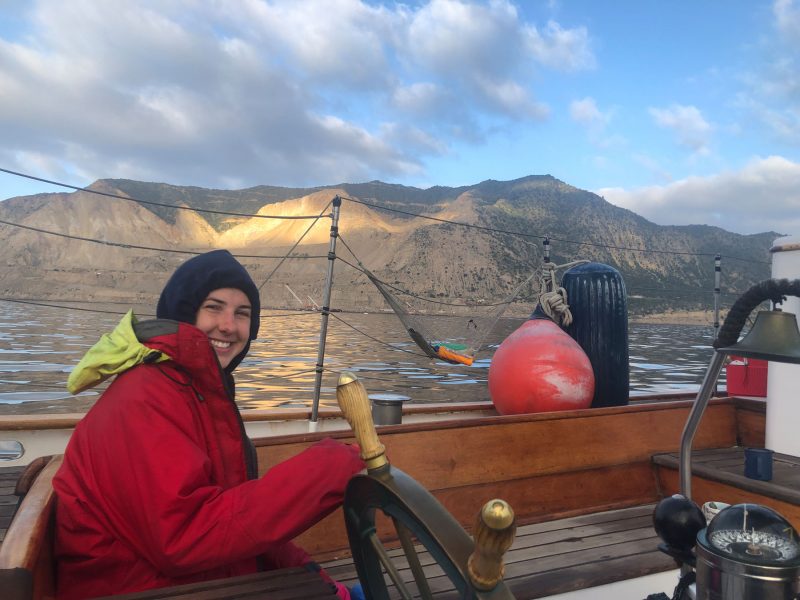
Two additional hands who had planned to meet the vessel in Cabo and supplement her crew were unable to make the journey, and Seaward’s crew was looking like being a four-person delivery team.
However, in true sailor-like fashion, Natalie chose to stay with the boat and take her share of the four-on-six-off watch rotations. “Your grandfather will be proud,” one crewmember exclaimed in relief. Natalie’s grandfather, Alan Olson, is a lifelong sailor and one of the founding members of Call of the Sea. “He taught me to sail,” Natalie shared.
So it came about that on Tuesday, March 31, three months and one day after departing Sausalito, Seaward left her dock in San Jose del Cabo and embarked on what for three of the crew was the longest voyage they had ever undertaken. “Six days and six nights offshore is my record,” said Monica Grant, Seaward’s cook for the Mexico season. By contrast, Capt. Jay Grant and Mate Jessica Bucklin had each crossed the Atlantic.
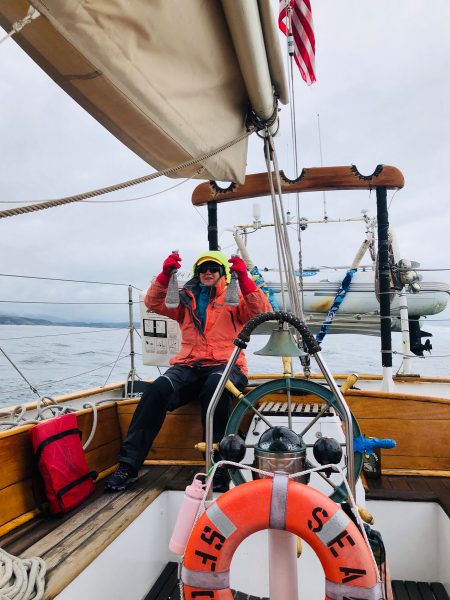
Anyone who has sailed the Baja and US West Coasts north in April will know that the passage is often called the Baja Bash. “Can we not call it that please?” Monica asked. “Perhaps we’ll get lucky and have a southerly wind all the way.”
In order to avoid the traditional coastal ‘bash’ the plan was to sail about 400 miles west of Cabo and catch the trade winds north. “These should take us right up to the Bay Area and then we can tack and head straight in,” Capt. Jay said.
As with all ocean sailing, the weather and sea conditions could only be forecast, not guaranteed. After her first 2 a.m. to 6 a.m. watch in which she steered Seaward through high seas and 20-plus-knot winds, deckhand Thanie Pesavento issued a high-five to her watch mate. “We made it through the first night! Woohoo!”
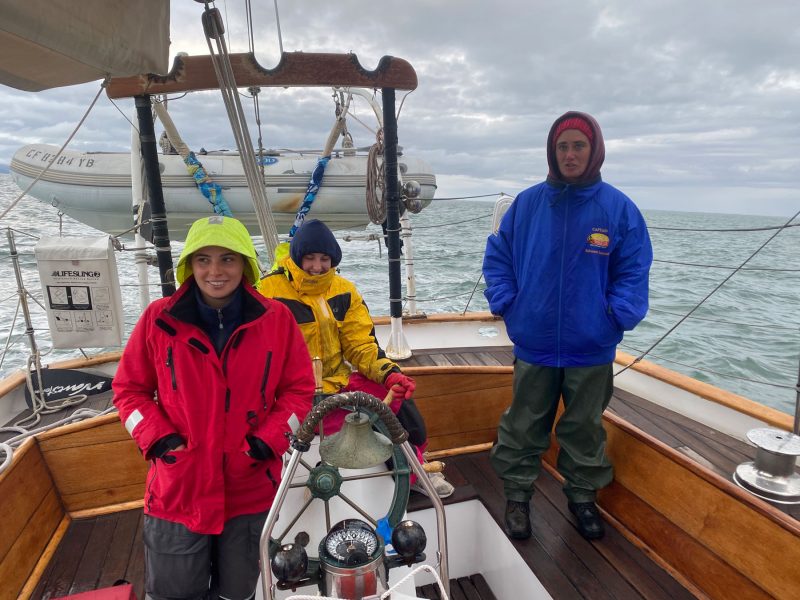
However, after several days of sailing in a northwesterly direction, it became apparent that the weather awaiting the vessel farther north would not be conducive to a comfortable journey. The three least-salty crew, by now in various stages of seasickness, were somewhat relieved to turn and head the boat northeast toward the coast.
From here it was simply a matter of motorsailing north, with a pause in Cojo Anchorage, north of Santa Barbara, while a gale blew offshore. “There’s a fishing boat here,” Jessica noted. “If the fishing boat is sheltering, it must be rough out there.”
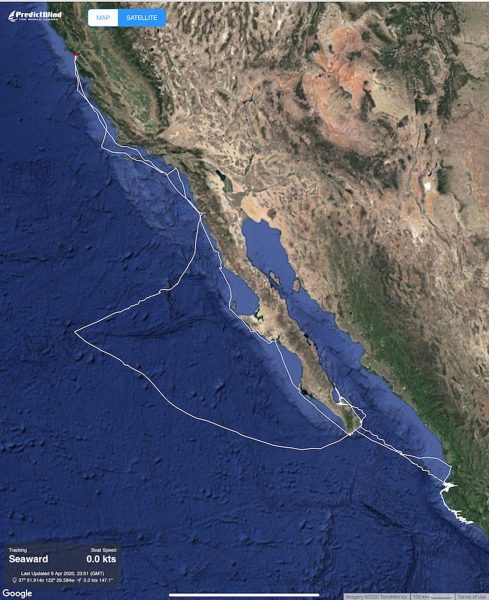
The last two days of the voyage brought little wind and lots of rain. Despite this, the crew remained cheerful and kept their sights on home. “We’re nearly there,” was the cry from several lips as various familiar landmarks came into view.
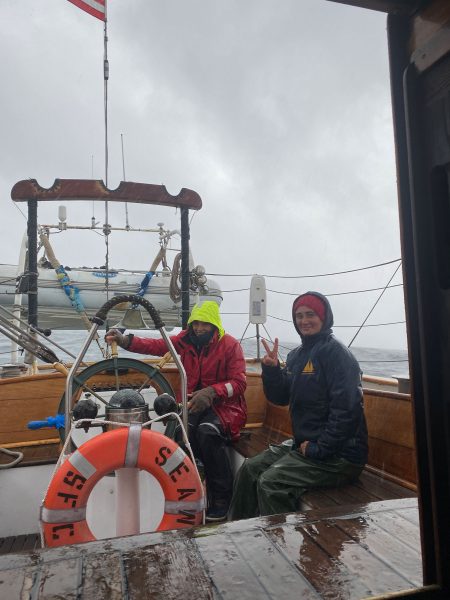
But as Seaward turned her bow toward the Golden Gate Bridge, the vessel was instructed to wait outside while the Coast Guard determined her entry status. “I was worried we’d have to turn around and find somewhere to anchor for the night,” Monica said.
Thankfully it was only an hour or so before the order was given, “Bring her in,” and Seaward and her hearty crew felt the warmth that accompanies arriving home.
Keeping Creative (and Sane) in the Time of COVID
Greetings, Latitude Nation, from 37° South.
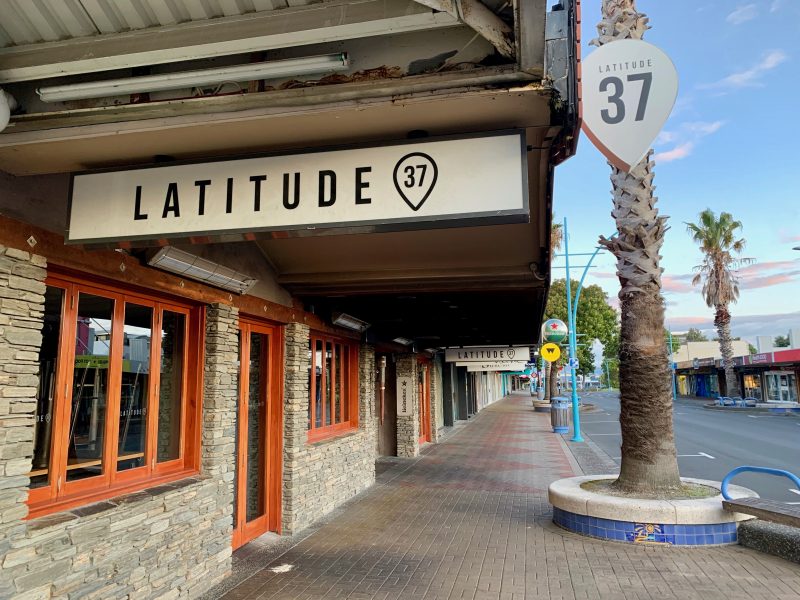
Life here in New Zealand is probably similar to that in the rest of the world: The main attractions are your living room, Netflix and taking long, destination-less walks. As we’ve hunkered down and really gotten to know our settees and internet connections, we have been scouring the internet for those rare rays of sunshine, many of which take the form of memes:
We could not help asking ourselves how sailors are staying sane, productive, and, with any luck, creative in these strange times.
We had hoped to visit with Emirates Team New Zealand while here in the Land of the Long White Cloud, but the current keepers of the Cup are on lockdown with the rest of the country. With the next America’s Cup set to start in almost exactly one year, it’s not clear how the current pandemic will affect the event. There may or may not be something to say about the 36th America’s Cup in the May issue of Latitude 38, but we are happy to report that ETNZ is doing their part to encourage Kiwis to quarantine and stay busy.
“Alright, so [you’re] stuck at home and running out of things to do, well we have you covered with a few Special Projects and a chance to win some ETNZ gear,” Team New Zealand said on their website in late March. “Geoff Senior, the team construction manager, has tasked you with designing your own AC75. He loves Legos, but if Legos [aren’t] your thing, feel free to build your AC75 out of whatever you have lying around. Just make sure you check with mum and dad before using the toilet paper to build the mainsail.”
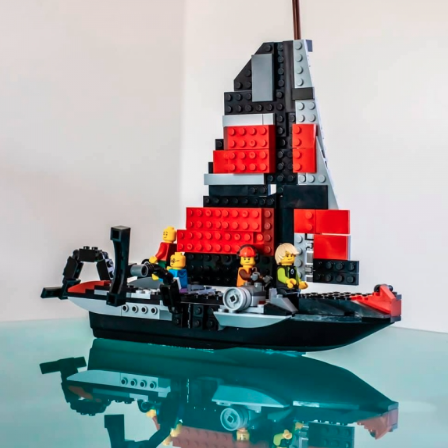
As for our own creative juices, we’re happy to report that long hours at home are welcome — and normal — for those of us inclined toward writing and art.
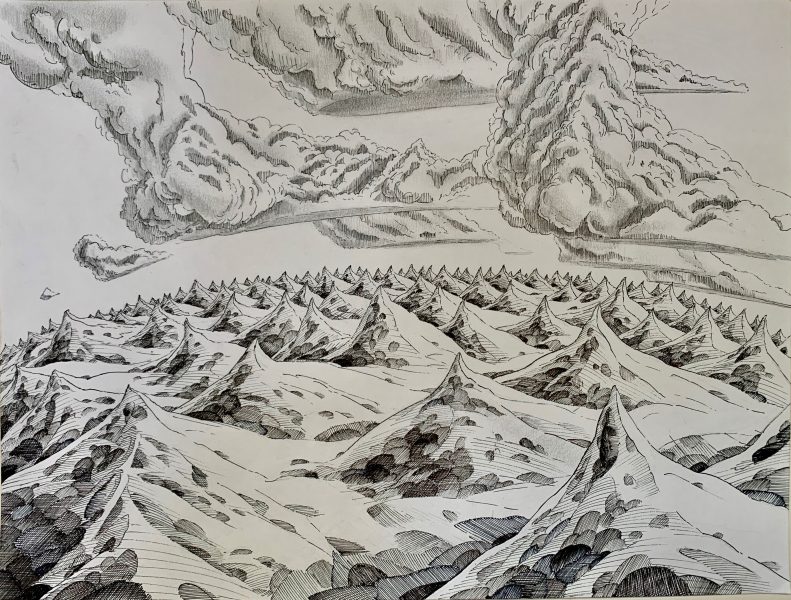
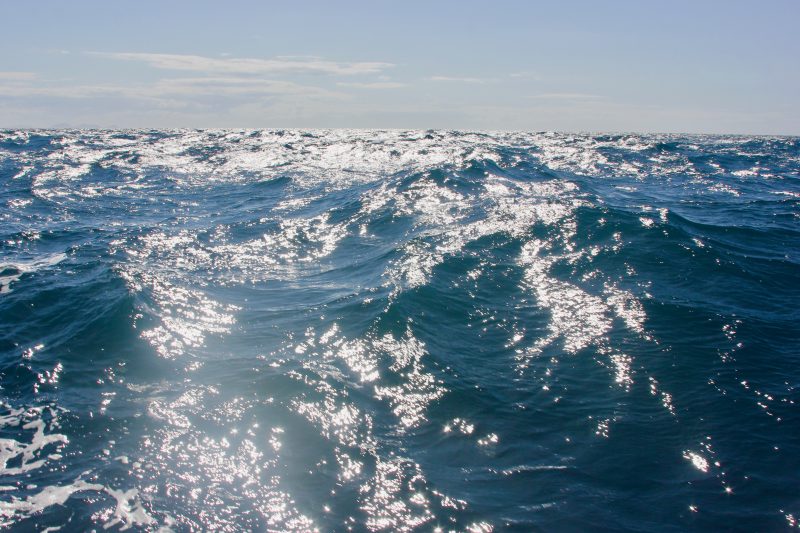
So how are you keeping creative, Latitude Nation? Some of you have made contact with us from the deep recesses of your quarantine caves.
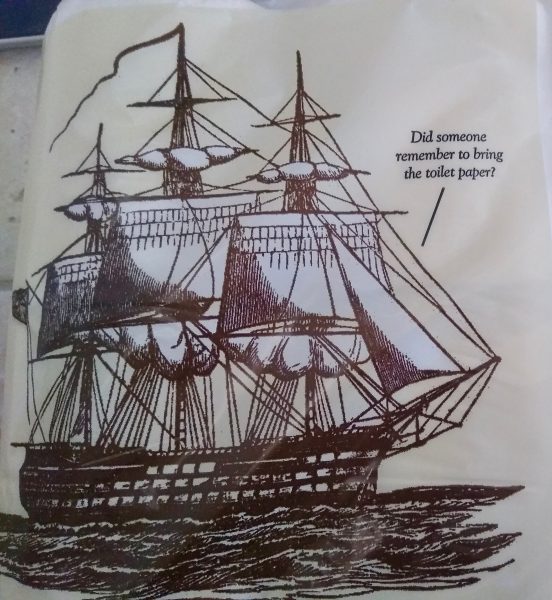
Reader Jake Goza brought to our attention a bit of sailorly art on a non-sailor. “I heard today on CNBC that Lady Gaga will be the point person for organizing a COVID-19 Support Concert,” Goza wrote. “I happened to notice a nautical looking anchor tattoo under her left arm. I thought I’d present it to you as potentially something to report on . . . in this time where not much sailing is going on.” Thanks, Jake. Our investigative team is on it.
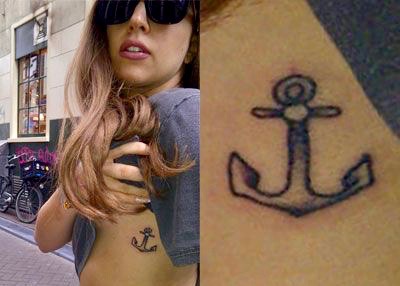
Finally, what are you doing just to continue some type of normalcy in your life? Here’s a photo from Kevin Plencner. “Avid readers of your publication practicing proper precautions to get your latest issue at Tahoe Keys Marina and Yacht Club at South Lake Tahoe.”
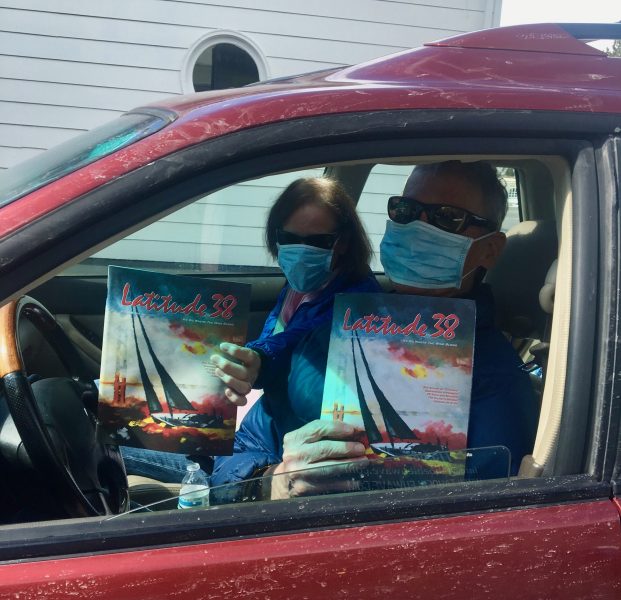
Finally, a millennial lady captain brought the following rendition of that most classic of sea chanteys to our attention.
Thanks to everyone for writing to us. We’re glad you’re staying safe and sane. We’ll see you on the water sooner — we hope — rather than later.
A Message from the Race to Alaska Boss
“Over here at Races High Command we turn on every computer monitor and radio, set them all to news stations, and spin in circles until we find a station that is not reporting on COVID-19. We are still spinning,” writes Daniel Evans, Race Boss of the Race to Alaska.
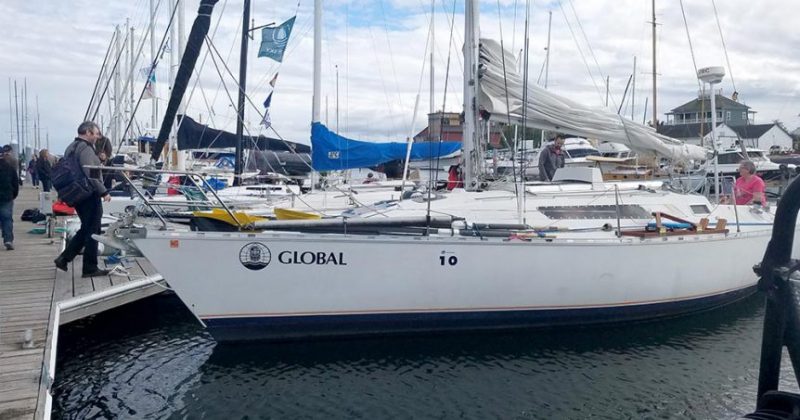
“It’s because this virus is no joke. The total of fatalities in New York has now exceeded the terrorist bombing of the Twin Towers on September 11. Canadian borders remain closed to visitors. The Washington governor has extended the statewide shelter-in-place order. State parks, like our SEVENTY48 race site, Blake Island, remain closed. The Heiltsuk Nation, which includes the R2AK waypoint of Bella Bella, issued a bylaw closing their territory to non-Heiltsuk populations.
“No corner or map edge is safe from the virus.
“So, why are we holding out against all this evidence?
“We’re not really ‘holding out.’ We are paying attention. We are measuring the distance between do and don’t, can’t and won’t, want to and why risk it… We are waiting because, despite the obvious, we can wait.
“We love the waters these races traverse and have spent many years upon them. We wouldn’t run the races if they endangered communities. The fact that we haven’t made our decision has no bearing on our sensitivities to rural communities along the route or local and federal laws; it is tied to the fact that this pandemic changes every day, and if we can wait to make a more informed decision, we will. And we can wait, a little while longer. On April 24, we’ll be announcing the final and permanent decision on R2AK and SEVENTY48 for 2020. Until April 24, all application and registration processes will be suspended.”


